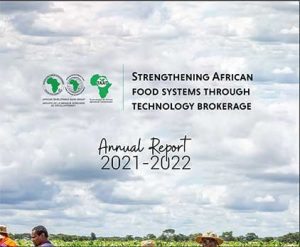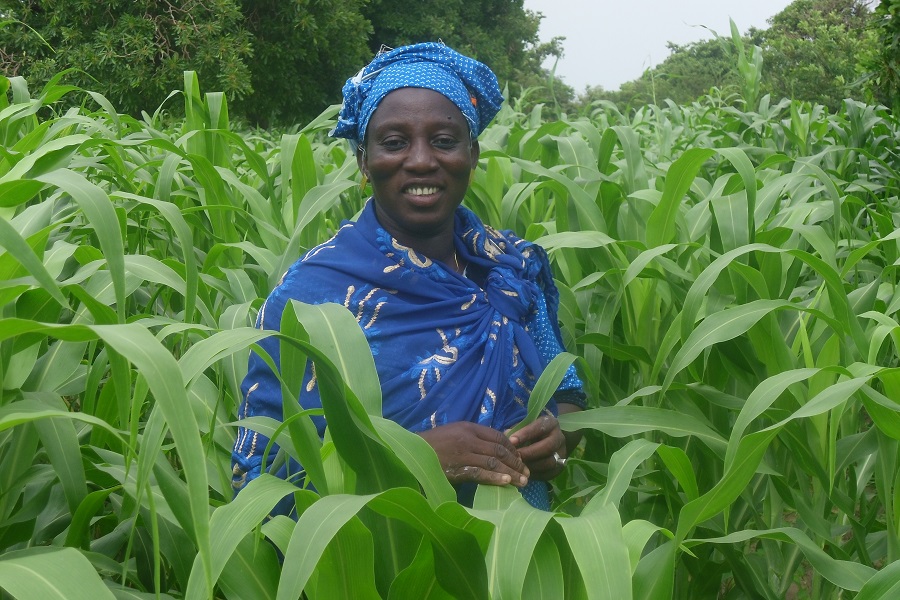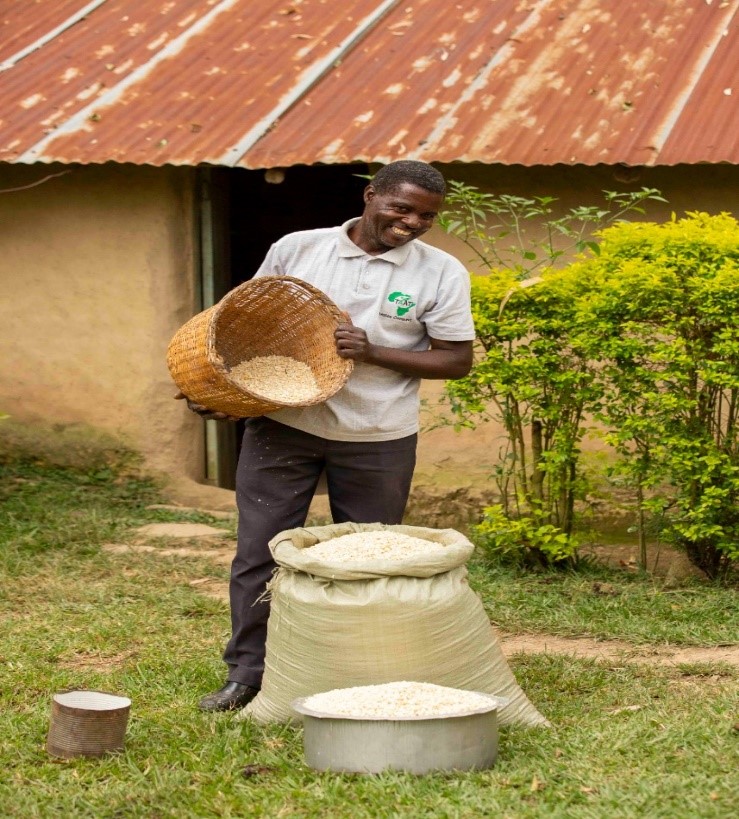
2021 – 2022 TAAT Annual Report
Pages: 48
Doc type: pdf
Size: 31MB
This report is a production of the TAAT Program Management Unit and the TAAT
Clearinghouse. The Editors received contributions in stories and photos from TAAT Compact
Coordinators. The TAAT Communications Unit provided complimentary photographs
included in this report.
Compact Mais de TAAT
Pages: 2
Doc type: PDF
Size: 2.1MB
Deployment of Maize Technologies in Western Kenya – An Outcome Case study report
Pages: 19
Doc type: PDF
Size: 861KB
An Outcome Case Study Report
Maize Technology Toolkit Catalogue
Pages: 36
Doc type: PDF
Size: 2.98MB
This catalogue describes a suite of technologies related to the modernization of maize production in Africa. It is based upon the combined efforts of the Project Platform for Agricultural Solutions (ProPAS), an information internet site, and the Technologies for African Agricultural Transformation, a large collaborative program that is deploying agricultural solutions across the continent.
African Development Bank approves phase II of TAAT programme – Taat-Africa
Pages:
Doc type:
Size:

The African Development Bank has approved the commencement of phase two of the Technologies for African Agricultural Transformation (TAAT) programme. The Bank Group’s Board of Directors, on Friday, 15 July 2022, approved the release of an additional $27.41 million to implement Phase II of the programme.
At the 15 August 2022 signing of the protocol of agreement between the bank and the executing agency for TAAT, the International Institute of Tropical Agriculture (IITA), the bank lauded the giant strides recorded under TAAT-I, which has galvanised the investment of more than $800 million in agricultural value chain projects in 21 African countries.
It has also mobilised $500 million in co-financing from the World Bank, the International Fund for Agricultural Development (IFAD), the Islamic Development Bank (IsDB), the Global Environment Facility (GEF) and other organizations, such as the Bill & Melinda Gates Foundation that support the TAAT Clearinghouse operations.
“The Bank is well positioned to harness the power of the science, knowledge and innovation needed to catalyse Africa’s agricultural transformation through this investment. The Bank already has extensive experience in agricultural development assistance in Africa, and this additional funding will help us to consolidate the achievements of TAAT-I,” said Beth Dunford, African Development Bank Group Vice President for Agriculture and Human and Social Development.
Speaking on behalf of the IITA Director General, Dr Kenton Dashiell, the institute’s Deputy Director General, partnerships for delivery, commended the bank’s commitment to transforming African agriculture through its Feed Africa strategy as well as the trust reposed in the consortium of agricultural research institutions led by the IITA to implement the laudable objective of transforming African agriculture.
Dr Dashiell assured the bank that TAAT-II would work closely with African countries to support the implementation of the $1.5-billion African Emergency Food Production Facility. This facility was set up by the Bank in May 2022 to help African countries obtain additional resources for agricultural production to guard against an impending food crisis due to the war in Ukraine.
The facility is expected to provide certified seeds, fertilizers, extension services and post-harvest management technologies to 20 million farmers. It is expected to produce an additional 38 million tonnes of food (11 million tonnes of wheat, 18 million tonnes of maize, 6 million tonnes of rice and 3 million tonnes of soybeans) worth $12 billion over the next two years.
It would be recalled that countries that benefited from TAAT-I have substantially increased production and commercialization, raised farmers’ incomes and created job opportunities for women and youth. TAAT-I provided over 61,000 metric tons of heat-tolerant wheat seed varieties to Ethiopia. The seeds have enabled Ethiopia to boost its cultivated areas of wheat production from 50,000 hectares in 2018 to 167,000 hectares in 2021 and to 400,000 hectares in 2022.
In addition, Ethiopia has not imported wheat this year and is now producing wheat on 650,000 hectares and is on track to cultivating 2 million hectares next year. The country harvested 2.6 million tons and plans to begin exporting to Kenya and Djibouti next year.
Drawing largely on the results of TAAT-I, TAAT-II will strengthen national and regional seed-production systems to provide farmers with sufficient climate-resilient seeds, using a market-based model and helping local private sectors spread technologies and services (seeds, fertilisers, extension) on a larger scale in villages.
TAAT-II incorporates a nutrition compact (soybeans, vegetables, orange-flesh sweet potatoes and high iron beans) to develop nutrient-rich commodities, raise awareness and improve the adoption of foods with high nutritional values.
Established in 2018 as a key flagship programme of the Bank’s Feed Africa strategy (2016 – 2050), TAAT is a continent-wide initiative designed to boost agricultural productivity by rapidly delivering proven technologies to millions of farmers.
TAAT seeks to double crop, livestock, and fish productivity by expanding access to productivity-increasing technologies to more than 40 million smallholder farmers across Africa by 2025 and generating an additional 120 million metric tons.
Growing water-efficient and climate-smart maize has changed my life – Kenyan farmer – Taat-Africa
Pages:
Doc type:
Size:

When he bumped into his former primary school classmate along the roadside way back in 2013, the meeting was meant to be a normal catch-up conversation between peers.
Having parted ways after finishing primary school in 1986, Stephen Melchizedek and Margaret Awinja went down memory lane. During their conversation, Margaret was keen to know what Stephen had been doing with his life after they left school.
Unlike Margaret, Stephen could not proceed with his studies due to a lack of school fees. This forced him to join his father in doing menial jobs to support the family. He would later work as a small-scale farmer in his Shirembe village, Kakamega County, in Kenya.
At the point of their meeting, Margaret, who upon completion of primary school, had proceeded to secondary school and after that acquired college education was now working as the coordinator of Western Region Farmers Network (WEREFANET), a local Community-Based Organization (CBO) in Kakamega County.
“She introduced me to her organisation that was working with different groups of farmers across Kakamega County. Given my work as a priest and the influence I have in our area, she tasked me to bring together farmers to form a CBO where we could learn how to improve our farming activities,” Stephen narrates.
Without hesitating, Stephen moved with speed and marshalled farmers through his local church and within a short period, Shirembe Tuinuke CBO was established with him as the coordinator. The group was to be an affiliate of the larger WEREFANET that Margaret heads.
Shirembe Tuinuke CBO works with 41 farmers from the Shirembe sub-location and a total of 800 farmers from the larger Butere Sub-county. Stephen says that the members’ farming practice improved over time, and they witnessed specific changes when they were introduced to the Maize Compact of Technologies for African Agricultural Transformation (TAAT).
“In 2014 through WEREFANET, we were introduced to WEMA project which has helped farmers from this region improve their maize production,” he points out, adding that being small-scale farmers, they usually operate with limited farming knowledge and poor agricultural practices.
At 61, this father of four says that the WEMA Project trained all the Shirembe Tuinuke CBO members on the recommended good agricultural practices and changed their way of doing agriculture.
“In February 2021, we had a training organized by TAAT Maize Compact (TMC) on post-harvest management. Through such training, we have learnt how to handle, store and even transport our maize produce to the market,” he explains.
To help smallholder farmers like Stephen address challenges related to maize production, the African Development Bank launched the TAAT Maize Compact in 2018 to disseminate at scale, water-efficient and other climate-smart maize varieties and complementary technologies across 11 countries in Africa.
Led by the African Agricultural Technology Foundation (AATF), TMC promotes high-yielding, climate-smart maize varieties and accompanying technologies to increase productivity and improve household income among smallholder farmers in Kenya, Uganda, Tanzania, Ethiopia, Rwanda, Zambia, Zimbabwe, Nigeria, Ghana, Cameroon and Benin.
Since 2014, Stephen has planted the WE1101 maize variety that was promoted under the WEMA project. He prefers WE1101 over local varieties he has been planting for years due to its fast maturity and good husk cover on the cob that protects the grain from being damaged by birds and strong stems.
“The best thing about this maize is that it is sweeter than the other varieties, the maize plants are strong, and so they are not affected by wind

or heavy rains; their cobs remain closed until harvesting time,” he says. He explains that during the second planting season in 2020, he harvested 11 bags of maize from his quarter-acre land.
This is a far cry from the three bags of maize he used to harvest before he started using hybrid seeds. Stephen later sold six bags at Ksh 2,200 (approximately $ 22) each, with the proceeds going towards paying school fees for his daughter in high school. He kept the remaining five bags for family consumption. He quickly points at the cow he recently bought from the sale of maize harvested from the first season in 2020.
Stephen’s story mirrors those of his group members who confirmed that their livelihoods have improved since they began planting the WE1101 hybrid seeds. The varieties are water-efficient, tolerant to moderate drought, and fast maturing. The maize variety was approved for commercial release to farmers in 2013 in Kenya under the trademark DroughtTEGO.
According to Dr Munyaradzi Jonga, the TMC Leader at AATF, the maize technology toolkit being deployed and promoted comprises elite Water Efficient Maize for Africa (WEMA) varieties such as WE1101, Drought Tolerant Maize for Africa (DTMA), Stress Tolerant Maize for Africa (STMA) and NARS breeding programmes. Others include appropriate fertilizer blends, efficient pest, disease and weed management, post-harvest management and mechanisation of farming operations.
“Implementation of this toolkit will significantly improve the productivity of maize production,” he explains, adding that the goal is to create more demand for these maize technologies and improve household incomes.
Experts predict that with global changes in climate, regions such as East Africa are likely to be disproportionately affected by drought, making the need for resilient seed varieties paramount to improve farmers’ livelihood.
By George Achia
TAAT Receives Gold Stevie® Award in 2021 International Business Awards® – Taat-Africa
Pages:
Doc type:
Size:

The African Development Bank received a first-place “Gold Stevie” at the 18th Annual International Business Awards virtual event, in recognition of the institution’s digital campaign showcasing its Technologies for African Agricultural Transformation (TAAT) initiative.
The International Business Awards honoured the Bank in the Best Video – Documentary category during an online ceremony Wednesday. TAAT’s wheat compact video led a series of clips demonstrating how TAAT is delivering agricultural technologies to help 11 million smallholder farmers across 30 African countries increase productivity and adapt to climate change.
“The Gold Stevie recognition solidifies the African Development Bank’s commitment to balance the narrative about the continent, by sharing success stories about efforts to feed Africa and improve the quality of life for the people of Africa,” said Dr. Beth Dunford, the African Development Bank’s Vice President for Agriculture, Human and Social Development.
“We’re scaling up TAAT through our new ‘Mission 1 For 200’ financing facility that aims to mobilize $1 billion to feed 200 million Africans by 2025 – there are more stories to be told,” Dunford added.
The Bank broadcast the TAAT video series in April during the 2021 High-level Dialogue on Feeding Africa, which hosted more than a dozen heads of state, global leaders, as well as thousands of online participants.
The 2021 International Business Awards, the world’s only all-encompassing business awards competition, drew more than 3,700 nominations from 65 nations. Wednesday’s virtual awards ceremony coincided with the close of the Tokyo Nutrition for Growth Summit, which explored the global challenge of malnutrition.
“As world leaders return from the Tokyo Nutrition for Growth Summit energized to accelerate progress on defeating malnutrition, we share this honour with our TAAT implementing and regional member country government partners working to produce more – and more nutritious – foods,” said Martin Fregene, the Bank’s Director for Agriculture and Agro-Industry.
Stevie Award winners were determined by the average scores of more than 260 executives worldwide who participated in the judging process from June through early August.
This 18th annual International Business Awards recognize outstanding organizations and highlight their positive contributions globally. Last year, the Bank earned a Gold Stevie for its 2019 Annual Report in the publication category and bronze for the Report’s companion video.
This year’s other award winners include Google, IBM, Yapi Kredi, DHL Express Worldwide, Dubai Municipality and Tata Consultancy Services.